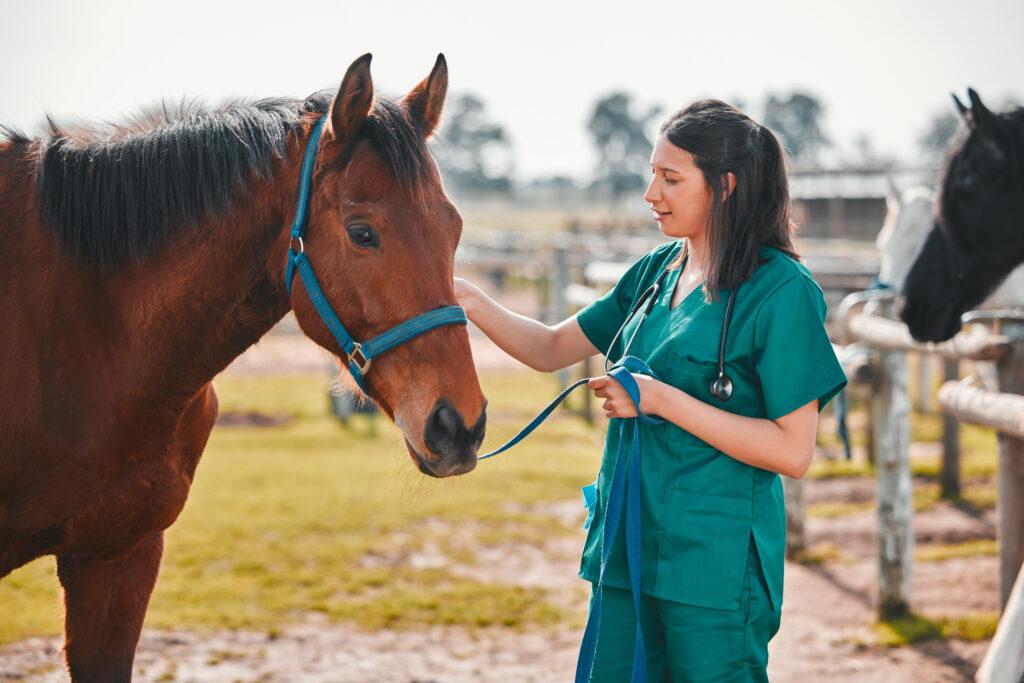Equine Zoonoses
Here’s what to know to protect yourself and your horse from zoonotic diseases that can spread from him to you.

What is a zoonotic disease? It’s an infectious illness transmissible under normal conditions from animals to humans. Although it’s relatively rare for humans to contract a disease from a horse, it’s definitely possible. Here, we describe equine zoonoses you should take simple measures to guard against.
Rabies.
This viral disease of mammals is virtually 100% fatal once clinical signs appear. Your horse can catch it from the bite of a rabid animal (including skunks, opossums, and other wild species). You can catch it from him via contact with his saliva. Vaccinating your horse is the simple and recommended protection against this particular zoonosis.
[READ: How the “one health” concept limits spread of zoonoses.]
Ringworm, rain rot.
Ringworm (dermatophytosis) is a common fungal skin infection of horses, humans, and other mammals; it presents as scaly round areas of hair loss. You can catch it from your horse via contact with his lesions or contaminated equipment. Rain rot (dermatophilosis) is a bacterial skin disease that causes matted hair and skin lesions in horses; you can catch it through direct contact with the lesions. Handwashing and protective glove use when treating these conditions on your horse will keep you safe from infection.
MRSA.
Methicillin-resistant staphylococcus aureus (MRSA) is a potentially serious illness caused by a bacterium that can be found in skin wounds and in the respiratory tract. MRSA can be transmitted from horses to humans and vice versa. Handwashing, glove use, and keeping wounds covered deter MRSA’s spread.
Salmonellosis.
This bacterial disease can cause acute or chronic diarrhea in horses; you can catch it from fecal-oral contamination when handling manure. Wear gloves and practice handwashing around any infected horse, or indeed any animal with diarrhea. Use care in disposing of an infected horse’s manure and bedding (composting will kill the bacteria over time).
[RELATED: Protect your horse from infectious diseases.]
Leptospirosis.
This bacterial disease causes abortion, uveitis, and kidney disease in horses. It can spread from horses to humans when the urine, saliva, feces, or placental or fetal tissues of an infected horse comes into contact with broken skin. Ingesting contaminated water can also infect you. Such spread is rare in the U.S. but worth preventing with routine hygiene measures.
Lyme disease.
This bacterial disease, the most prevalent vector-borne illness in North America, is spread by ticks. It causes a variety of symptoms in horses and can be difficult to diagnose in both horses and humans. You can’t catch it directly from your infected horse, but you can from an infected tick carried by your horse. A tick must be attached for at least 24 hours in order to transmit the disease. Use repellent products effective against ticks, and check your horse and yourself regularly during tick season in your area. (Make tick check/removal part of your daily grooming routine.)
Handwashing & Common Sense
To protect against zoonoses and other infections, make common-sense hygiene measures habitual around your barn. Wash hands frequently and use disposable gloves when dealing with a sick horse. For convenience, consider keeping hand sanitizer gel in your barn for use between handwashings.






